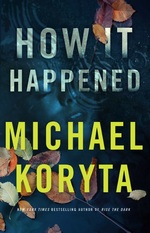 How It Happened
How It Happened
by Michael Koryta
Hardcover, 368 pg.
Little, Brown and Company, 2018
Read: May 29 – 30, 2018

The rain had tapered off overnight and given way to a gorgeous day, the sky and sea competing for the deepest blue, a light wind pushing off the water, temperature nearing eighty. The air was scented with ocean breezes and pines and held only the faintest trace of humidity. A quintessential Maine day, more suited to July than May.
If you weren’t looking for a drug addict and self-confessed murderer, it would be a day to treasure.
This is one of those that comes down to the set-up. Because it’s executed practically flawlessly, and if you’re in for a penny, you’re in for the whole pound — and it’s a heckuva ride. You won’t want to get off until the end, and then you’ll be able to breathe for the first time in seventy pages or so. If you’ve read Koryta before, you have an idea what things’ll be like — and you’ll be right. If you’ve not read him before, you probably will make arrangements to familiarize yourself with him soon after finishing this.
So, what is the setup? FBI Agent/expert on eliciting/evaluating confessions from criminal suspects, Rob Barrett returns to the small Maine community of his childhood summers to investigate a missing persons case/potential double homicide. After weeks of work, he finally gets a seemingly reliable confession from Kimberly Crepeaux to what happened to the missing young people. It’s a harrowing confession, I have to say — I’ve read novels with less tension than her recounting of what happened that night. Kimberly is a drug addict, jailhouse snitch, and all-around unreliable person — everyone in town knows this. But Rob believes her (and you will, too).
But there are a couple of problems. Problem one: Mathias Burke is the man that Kimberly says is the murderer. Mathias is a go-getter of a young man, and has been since he was a kid — the dictionary might as well feature his picture under “industrious.” No one in town can believe anything Kimberly says about the way he acted that night — even the non-criminal aspects of it. None of it is characteristic of him. Problem two: the bodies aren’t where she says they were. In fact, they’re found miles away and seemingly killed in a different fashion, with the fingerprints and DNA of someone not Mathias Burke present.
So much for Kimberly’s confession — and Rob’s career. He’s shipped out to a field office in Montana, probably for the rest of his career.
But Kimberly sticks to her story, and convinces the father of one of the victims, Howard Pelletier, to believe her (and fear for her safety from Burke). Howard’s wife died when his daughter, Jackie, was young. He became the most devoted single father in history, and in time, she reciprocated. The story of Jackie and Howard would be enough for a novel, were it not for the murder. Howard’s insistence that Rob pay attention to Kimberly again and his need for answers brings Rob back for one more try at finding out how it happened.
Pretty good hook, eh? And like I said, once it’s set, Koryta reels the reader in just like the seasoned pro he’s become.
A strange thought occurred to me this weekend: this could very easily have been a Richard Russo novel — I’m not sure who the protagonist would’ve been — maybe the cafe owner or something. But Rob, returning to his childhood stomping grounds (however temporarily), Howard and Jackie would’ve easily have been fixtures — ditto for Mathias Burke (and even Kimberly, come to think of it). Mathias would be a major player, really — not the protagonist, but a lead character for sure, his troubled youth, his Horatio Alger-ish work ethic/success story, the way that this silly FBI interloper messed up his life, etc. The tangled lines connecting all these people would be seen more clearly, and traced back a generation or two, making everything more complex. Actually, the more I think about this, the more I want to see Russo write his take on these elements. Anyhow, this isn’t a Richard Russo novel — this is a Michael Koryta novel. So, it won’t be anywhere near as funny, the psychology will be presented in starter light, the tension level will be much higher, and the sense of right and wrong will be much less murky.
A knockout of a read — a great thriller to kick off your summer with.
—–



